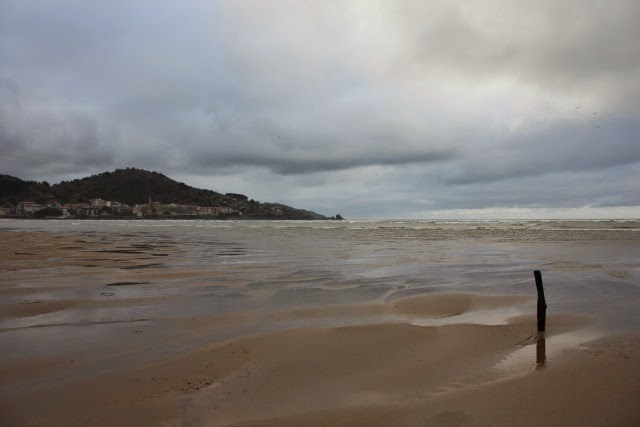Love beach at winter. Love walking on silence on wet sand. Feeling your feet going down as you walk. The wind flowing, reminding phrases you thought were forgotten. Just hearing your inner voice, as you walk to the sea. Alone.
Love having all beach for you. Feeling that that huge sky is there to make you small. Those clouds, grey of rain are just waiting a moment, before starting to cry.
Love finding secrets on the sand. Old woods from broken ships, or just travelling trees. Pieces of life, sheeds, stones....an imaginary word of life.
Love escaping to beach in winter.
And you, summer or winter beach lover?
Me gustan las playas en inviernos. Caminar por la arena mojada. Sentir como se hunden los pies a medida que voy caminando. El viento soplanto y susurrando palabras que creías olvidadas. Simplemente escuchando a tú yo interior mientras el silencio se apodera del paseo.
Me gustan las playas en invierno, sintiendo el enorme cielo cayendo sobre mí. Esa nubes, grises de lluvia que aguantan la respiración mientras paseo, para llorar lágrimas frías una vez decidimos marchar.
Me gusta encontrar secretos en la playa. Imaginar el lugar de procedencia de las maderas, inventar historias alrededor de las conchas y tratar de adivinar lo que ocultan los extraños objetos que el mar decide devolver.
Me gusta escaparme a la playa en invierno.
Y vosotros sois de playa en invierno o verano?
Neguko hondartzak gustoko ditut. Ixiltasunean ibili, oinak areian sartzen diren bitartean. Haizeak azpaldi ahaztutako hitzak gogorarazten dizkidan bitartean.
Neguko hondartzak gustoko ditut. Non haunditasunean zerua izugarria iruditzen zaigun. Non hodei grisak euriz gainezka kotzera itzultzen garen harte itxaroten duten, negarrez euriz dana garbitu harte.
Neguko hondartzak gustoko ditut. Non sekretuz beteriko altxorrak topa daitezkeen. Non aurkitutako oholen historioa bilatzen dugun, non kontzaz beteriko poltsa etxera ekartzen dugun eta non topatutako gauza arraroen inguruan historio arrigarriak imaginatzen ditugun.
Maite diat neguan hondartzara ihes egitea.
Eta zuek, uda ala negu hondartzakoak zarete?


















